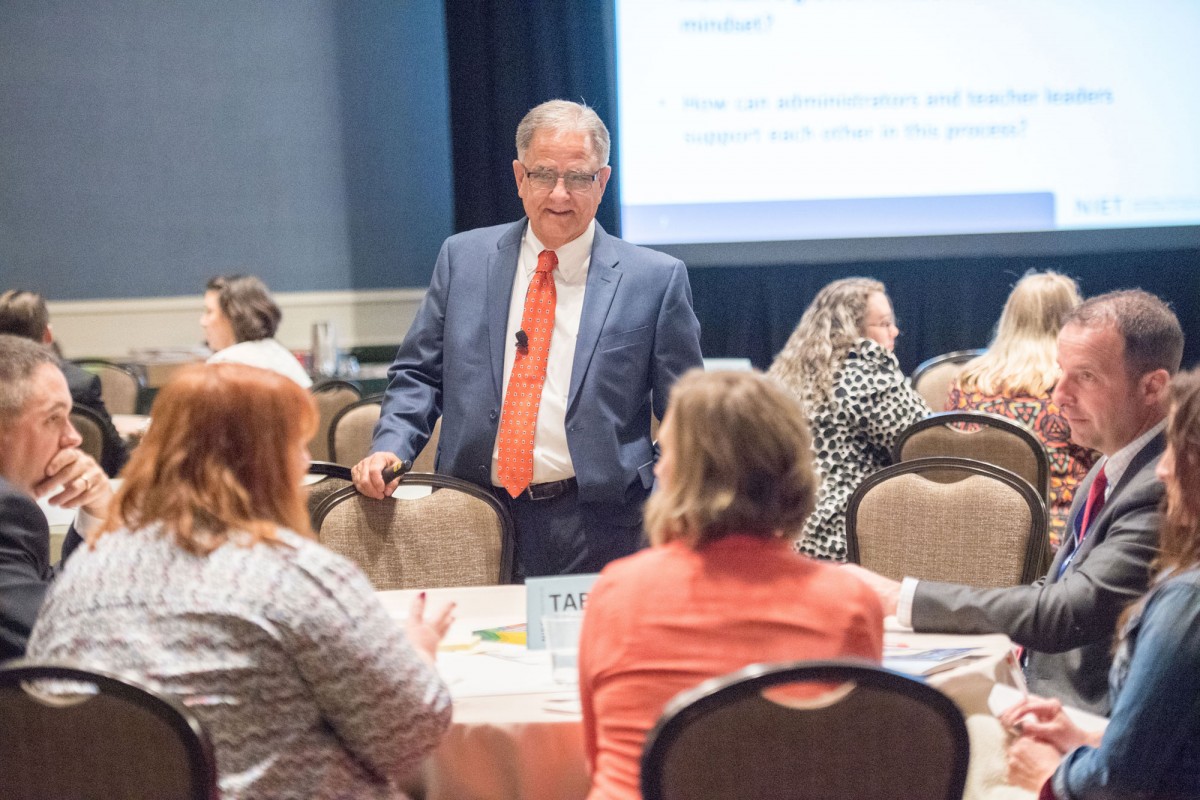Strengthening School Leaders' Skills in "Motivating Teachers"
January 9, 2018

School leaders working in partnership with NIET are looking for support in increasing instructional effectiveness across their faculties. NIET Director of Training Dr. Ann Shaw collaborated with Senior Trainer Teddy Broussard to create a series of new training opportunities for principals, including one addressing the challenge: What can principals do to motivate teachers?
Using the Instructional Rubric that guides teachers' instruction with students, school leaders in the training use the indicator "Motivating Students" to identify ways to strengthen support and feedback for teachers.
Principals identify specific ways that they could increase teacher motivation by making feedback and support more meaningful and relevant, valuing inquiry and curiosity, and reinforcing and rewarding effort. Video clips of successful school leaders describing their strategies are followed by small group work by participants who identify and analyze their own practices and determine strategies for improvement.
Making Feedback and Professional Learning Personally Meaningful and Relevant
Just like students, principals know that teachers want to know why they are being asked to do something and how it supports student learning. For learning opportunities to be meaningful for teachers, they should be directly tied to the needs of their students, as illustrated through data and student work, and to individual teacher needs, based on observations of their classroom practice. To be useful and relevant, feedback must be detailed, timely, illustrated through specific examples.
 When a principal starts the conversation with, 'How can I help you to improve?' rather than 'Here is what you are doing wrong,' that is motivating to teachers. When they see that the support they are receiving is helping their students to grow, that is even more motivating."
When a principal starts the conversation with, 'How can I help you to improve?' rather than 'Here is what you are doing wrong,' that is motivating to teachers. When they see that the support they are receiving is helping their students to grow, that is even more motivating."
Kevin R. George, Superintendent, St. John the Baptist Parish Public Schools, Reserve, Louisiana
Watch Superintendent George offer more insights in this video.
Weekly professional learning or "cluster" meetings are designed to be meaningful and relevant to each teacher. Student strategies are field-tested by teacher leaders with students in the school to demonstrate their relevance and impact before being introduced in cluster group. Teachers know that the time they spend in professional learning directly targets their individual needs and those of their students. They leave weekly professional learning with a strategy addressing specific areas of improvement, and a plan for implementing that strategy in their classroom the following week. Follow-up coaching by teacher leaders provides each teacher with individualized and differentiated support.
 Weekly cluster meetings and the follow-up they provide are most impactful. The follow-up that our teachers receive has been crucial to ensuring that their implementation of the best practices is working."
Weekly cluster meetings and the follow-up they provide are most impactful. The follow-up that our teachers receive has been crucial to ensuring that their implementation of the best practices is working."
Colleen Bergren, Principal, Scott Middle School, Hammond, Indiana
Valuing Inquiry, Curiosity and Exploration
School leaders set an example by being public learners. This illustrates their belief that everyone can improve, encourages teachers to take risks and stretch themselves, and sends a strong message that embracing new ideas, new approaches and new questions is at the heart of the learning process. By supporting and encouraging learning by teachers, school leaders reinforce the message that everyone can grow and improve and all students can excel.
Field-testing student strategies is a form of action research that reinforces the importance of inquiry and exploration. It involves teachers in analyzing data, solving problems for students in that building, and figuring out how to reach each student.
 Think about each teacher. What do you need to do as a leader to help that teacher grow? How can you help them to move their students? That is motivating for teachers."
Think about each teacher. What do you need to do as a leader to help that teacher grow? How can you help them to move their students? That is motivating for teachers."
Tammy Woolbright, Principal, Dodson Branch School, Jackson County, Tennessee

Reinforcing and Rewarding Effort
Teachers need frequent, consistent feedback on their instruction, along with opportunities to collaborate with colleagues to improve their own practice. Creating opportunities for every teacher to receive feedback for improvement enables school leaders to create a school environment that recognizes, celebrates and rewards effort. Collaborative professional learning and support from teacher leaders reinforces both individual teacher and group effort. Meaningful teacher leadership roles enable additional opportunities for professional growth, additional compensation and greater impact across the school and the district. Woolbright says it best: Principals "provide multiple opportunities for teachers to present, to have a voice, to use their expertise to coach each other, and to contribute to the leadership of the building."
These practices are built on and, in turn, strengthen the foundation of trust between teachers and school leaders.
 The essence of leadership is trust."
The essence of leadership is trust."
General Colin Powell